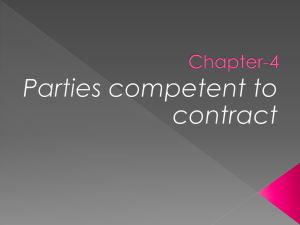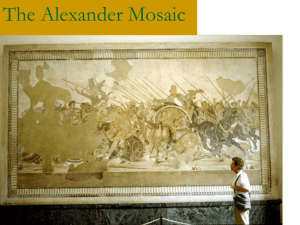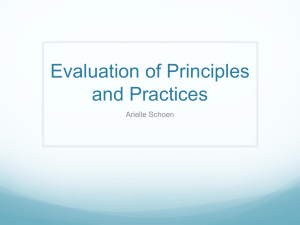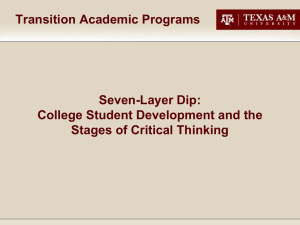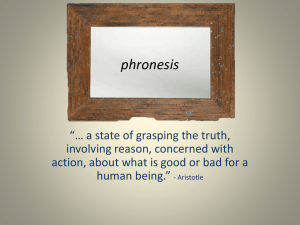PowerPoint - Rock Ethics Institute
advertisement
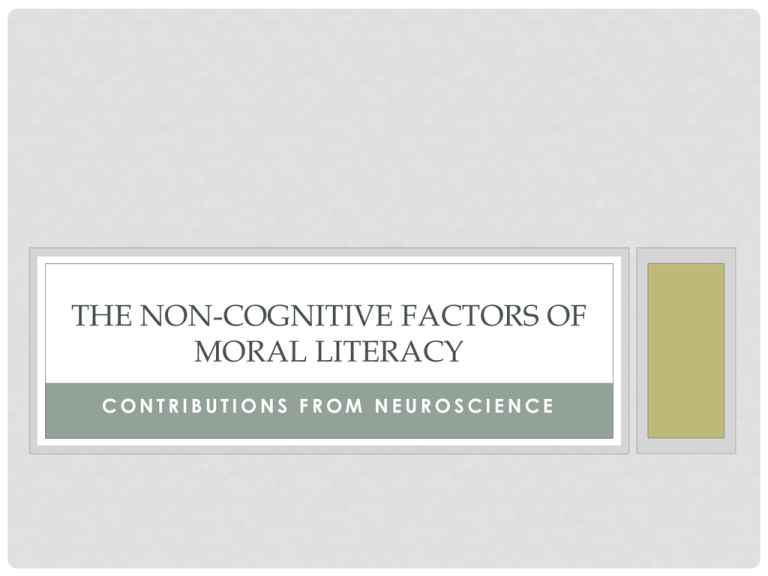
THE NON-COGNITIVE FACTORS OF MORAL LITERACY CONTRIBUTIONS FROM NEUROSCIENCE THE ROLE OF REASON, EMOTION & IMPULSE IN MORALITY “A moral being must be able to keep his natural impulses in check, to do what is required by the weightiest of moral reasons.” Kurt Baier “Rationality is not a force to evoke against habit and impulse, it is the attainment of a working harmony among diverse desires.” John Dewey JOHN DEWEY & F. M. ALEXANDER My theories of mindbody....required contact with the work of F.M. Alexander and in later years his brother A.R., to transform them into realities. 1859-1952 F. MATTHIAS ALEXANDER • Man's Supreme Inheritance, Methuen (London, 1910), revised and enlarged (New York, 1918), later editions 1941, 1946, 1957, 1996, reprinted 2002. • Constructive Conscious Control of the Individual, Centerline Press (US,1923), revised 1946, 2004 • The Use of the Self, E. P. Dutton (New York, 1932), republished by Orion Publishing, 2001 • The Universal Constant in Living, Dutton (New York, 1941), Chaterson (London, 1942), later editions 1943, 1946, Centerline Press (US, 1941, 1986), 2000. F. MATTHIAS ALEXANDER: BASIC PREMISE • Our“out-of-date”alarms: • The human condition is aggravated by the transition in human evolution from animal savagery to present civilization. • The incessant changes of“modern”society and the inappropriate internal responses they prompt lead to widespread “psycho-physical disequilibrium.” • Our untimely emotional responses—fear and anger— are responsible for our state of moral as well as physical deterioration. • Re-educating the nervous system—the internal, visceral domain—is necessary to modify our impulses. ALEXANDER: TRAINING AWARENESS THROUGH POSTURE AND BODY MOVEMENT • It is one thing to teach the need to a return to the individual man as the ultimate agency in whatever mankind and society collectively can accomplish....It is another thing to discover the concrete procedure by which this greatest of all tasks can be executed. And this indispensible thing is exactly what Mr. Alexander has accomplished. John Dewey JOHN DEWEY’S PREFACE TO F. MATTHIAS ALEXANDER “The technique of Mr. Alexander gives to the educator a standard of psychophysical health—in which what we call morality is included.” UNDERSTANDING OUR INTERNAL DISHARMONY: PSYCHOPHYSICAL DISEQUILIBRIUM, EMOTIONAL DISLOCATION, FIGHT OR FLIGHT & STRESS Walter B. Canon The Wisdom of The Body (1932) Hans Selye The Stress of Life (1956) THE MORALITY & PSYCHOPHYSIOLOGY OF ANGER (1947-1970’S) Researcher/Theorists Leonard Berkowitz K.E. Moyer Erich Fromm “Character-conditioned hate” The principal problem of ethics. Anger is an internal condition with physiological and biochemical correlates that makes reckless, aggressive responses likely to occur. Hans Selye: untimely, undue release of stress hormones can create a self-induced intoxication, more harmful than alcoholic intoxication. Aldous Huxley: “Adrenaline addicts.” UPDATE 1995: DANIEL GOLEMAN EMOTIONAL INTELLIGENCE • Goleman writes of the“emotional explosions”and“neural hijackings”which are not only prompted by the amygdala, but are prompted before the neocortex can respond—thereby explaining the“power of emotion to overwhelm rationality” (Goleman, 1995, p. 17). • Goleman refer to these as“emotional habits.” • Dewey did as well. REDISCOVERING DEWEY’S HUMAN NATURE AND CONDUCT (1922!) • “A man with a habit of giving way to anger may show his habit by a murderous attack..” • Even if occurs only once in his life. • Habits are not merely external acts. • Internal & External education ENTER CONTEMPORARY NEUROSCIENCE: DAMASIO, NEWBERG, ET AL • Our internal, physiological responses do not simply disrupt morality and moral thinking. • These responses make a critical contribution. • Harmony! SOME HISTORICAL PERSPECTIVE: THE CASE OF PHINEAS GAGE After an accident involving a tamping rod, Gage emerged with a changed personality. He survived, but apparently, the ventromedial prefrontal cortex had been damaged. ANTONIO DAMASIO’S DESCARTES’ ERROR (1995) VENTROMEDIAL PREFRONTAL CORTEX • Damage to the ventromedial prefrontal cortex (VMF) compromises reasoning/decision making as well as emotion/feeling. • The VMF appears to play a critical role in social/moral judgment and behavior. DESCARTES’ ERROR (1995) BY ANTONIO DAMASIO • Brain research indicates emotion—”somatic markers”—are a critical feature in decision making and conduct: requiring neither too much or too little. • Damage to this area can leave most cognitive functioning, reasoning in tact (IQ) but with a deficiency in social action. ENTER: THE ANTERIOR CINGULATE CORTEX (ACC) WHAT WE ARE DISCOVERING ABOUT THE ANTERIOR CINGULATE CORTEX: • The ACC lies in a unique position in the brain, with connections to both the amygdala, the “emotional” limbic system and the “cognitive” prefrontal cortex. • The ACC plays a significant role in mediating cognitive influences on emotion—both over and under regulation of emotion can cause problems (too much or too little). We need a “working harmony” as JD observed. ACC: THE ANTERIOR CINGULATE CORTEX: • The ACC appears involved in the detection of undesirable emotions and is thus critical to social awareness and compassion. • Strokes, lesions, or too much fear and anger (fight of flight) can damage the ACC—this can cause individuals to loose a capacity for empathy and instigate aggressive acts. • Part of PTSD. • JD on FMA: “a standard of psycho-physical health in which what we call morality is included.” AWARENESS TRAINING AND THE ACC • The shifting focus of our conscious attention will channel the flow of electrical activity through various circuits of the brain; some even stimulating activity in the ACC. • Meditation not only reduces stress, but also stimulates neural activity in the ACC supporting the premise that such practices enhance social awareness & compassion (fostering a “working harmony amongst diverse desires”). AWARENESS TRAINING AND HUMAN DEVELOPMENT • Because of the brain’s neuroplasticity, new patterns of repeated neural circuit activation strengthens synaptic connections associated with these practices. • F.M. Alexander believed children possess a “plastic intelligence” that must be nurtured properly to prevent mind-body habits that disrupt our “psycho-physical organism.” • We use the mind to change the brain and thus “take control of our own potentialities.” (John Dewey on F.M. Alexander; our “Supreme Inheritance”) ANOTHER STUDENT OF ALEXANDER’S: ALDOUS HUXLEY’S BRAIN METAPHOR TRAINING AWARENESS ALDOUS HUXLEY’S “NON-VERBAL HUMANITIES” Zen Archery Meditation Tai Chi We do not educate a “mind” or a “body” but a “mind-body.” Techniques for training awareness and increasing harmony. CONCLUSION • Portions of the brain that have been linked to executive control, social judgment and emotional processing are strengthened by techniques that train our awareness, in particular, meditation and other “Non-verbal humanities.” • Hence the critical role of seemingly non-cognitive factors in morality. THE FOUR DOMAINS OF MORAL EDUCATION EXTERNAL INTERNAL DIRECT DIRECT EXTERNAL DIRECT INTERNAL INDIRECT INDIRECT EXTERNAL INDIRECT INTERNAL THE EXTERNAL DOMAIN Direct Didactic Instruction: Conveying clear behavioral objectives for the moral-ethical domain. Helping students examine and understand the moral expectations for life in the classroom, school and society. Indirect Classroom and schoolwide activities/policies that foster moral climates: with specific regard to opportunities for applying moral principles to real problems in the classroom and school; collateral learning. THE INTERNAL DOMAIN Direct Indirect • Self-regulation & the Non-verbal • The examination of Humanities: training awareness; fostering harmony between the mind and body— reduce errant internal responses and nurture a capacity to find moral conduct intrinsically rewarding (endorphins). • Dewey:“rationality is not a force to invoke against habit and impulse, it is the attainment of a working harmony among diverse desires.” emotions: in oneself and in others—with special reference to their influence on our perceptions of others and ourselves, and our conduct with others. The consideration of strategies for controlling impulse and regulating mood: Golemans “Self Science.” ISLAND (1962) HUXLEY’S PRAGMATIC DREAM • Patriotism is not enough. But neither is anything else. Science is not enough, religion is not enough, art is not enough, politics and economics are not enough, nor is love, nor is duty nor is action however disinterested, nor, however sublime, is contemplation. Nothing short of everything will really do.

